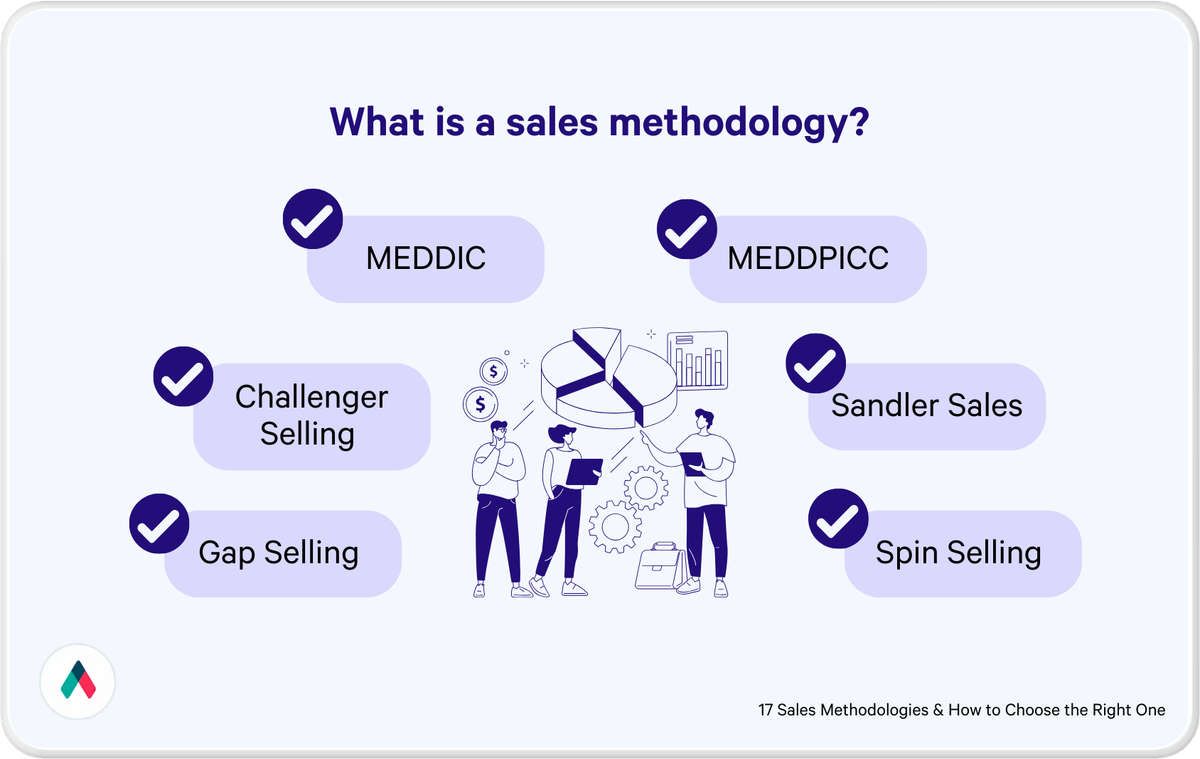
Navigating the complex sales landscape can feel like navigating a labyrinth, with its intricate twists and turns. However, there is a systematic approach that can help you effectively maneuver through this challenging territory.
In this article, we'll explore the nuances of the complex sales process, outline essential skills and tools required, and provide strategies for sales professionals and leaders to ensure hit quota.
What is complex sales?
Complex sales, also referred to during enterprise sales, typically involve lengthy sales cycles and customizable products or services.
These deals often require the involvement of multiple decision-makers, each with their unique priorities and objectives. Consequently, the sales process for complex sales can span months or even years in certain cases, can be challenging for reps and leaders, but can also be incredibly rewarding – both personally and financially.
There is no set price range for what constitutes a complex sale. It could be a multi-million dollar multi-year enterprise software contract for a large corporation or a $50,000 custom manufacturing order for a small business. The key is that these sales carry high value, and they may have longer sales cycles than more transactional sales.
Complex sales are typically associated with B2B transactions―think multi-year contracts for cloud services in IT or large-scale equipment purchases in manufacturing―although they’re not exclusive to these sectors. A high-end real estate property transaction might take months to complete due to negotiations, inspections, and financing arrangements in a B2C business.
What are the stages of complex sales?
Many of the deal stages in complex sales are comparable to a more transactional sales motion. However, it's the depth and personalization in each phase that sets complex sales apart. It's not typically a ‘buyer-committee-of-one’; it instead involves a multifaceted process and navigating a complex buying process with numerous stakeholders, each with their own demands and objectives.
Remember, complex sales are flexible - according to your product, service, or industry, there may be more or fewer steps. This 5-stage breakdown, however, provides a framework for building on.
Stage 1: Discover and Analyze
Complex sales require a detective's approach. You may or may not have an RFP to respond to. Your goal is to understand not only your potential customers but also their organizational structure.
Start at the organizational level. What is happening in the company? Are they growing rapidly, or have they faced layoffs or budget cuts recently? Have they raised a round of venture capital or gone through an IPO? Search Google, local business journals, and LinkedIn to give you a picture of what is happening in the business.
Next, you’ll want to start learning about the buying team. The goal is to discover every key player in their buying team's roles and objectives, as well as their business pain points.
For each member of the buying team, you’ll want to know:
- What are their prevailing challenges?
- What initiatives are they charged within the organization?
- What determines success in their role, and how might buying your product or service impact their performance or reputation in the organization?
- How much influence does this person have in the buying process? (If they say no, can the deal move forward?)
- How do they approach decision-making, and who makes the final decision in the deal?
- Are there any unknowns or X factors that could impact the deal?
Identifying these insights will help you determine how to best engage with each member of the buying team.
There shouldn’t be a ‘mad rush’ to get the deal over the line. Instead, it's about developing a solution and a strategy that aligns with the goals and expectations of each stakeholder. Building trust and credibility is the key to establishing a lasting relationship and ultimately brokering a deal that serves both sides, beyond moving the deal to ‘closed won’.
Stage 2: Define and Qualify
Once you have conducted your in-depth research, it's time to narrow your focus. It is at this point that you filter out the prospects with genuine needs, interests, and financial capacity.
Pursuing every prospect is neither a luxury nor a strategic move. You need to identify those in your sales pipeline with high potential. These are organizations with the need and means to invest in your solutions, not just those who express interest.
As part of this process, you will likely have many conversations with members of the buying team. The goal of these sales conversations is to get enough information to create the right proposal and create alignment with your buying team. This is not a process you can rush. In some deals, sellers meet with prospective buyers for months or years before submitting a proposal.
Why? It could be due to contract length. If your prospective client is in a long contract with their current provider, it might be months or years before they can make a change.
Stage 3: Propose
You've selected your top prospects, and spent a lot of time getting to know them. Now it's time to strike. In complex sales, here is where the rubber meets the road. It's time to submit your proposal - a precise, tailored strategy demonstrating how your product or service meets the requirements.
Remember that your buying team is likely made up of a diverse mix of people and roles in the organization. As you build customer relationships, you’ll begin to understand who needs what to get the deal done. You might need to provide case studies, technical specifications, and documentation on how your solution will work. But, non-technical team members may not understand the details in these documents; they just want to know how you can help them.
Now, what makes a great proposal in a complex deal? First and foremost, make sure you’ve hit all of the requirements. Then you want to show a new world in which your buying team and their colleagues are thrilled with your solution. Complex sales tend to be high risk for the buyers, too so anything you can do to mitigate perceived risk in your proposal may help you close the deal.
Your proposal needs to demonstrate how working with you will save time, money, and headcount or drive efficiency. This type of proposal will likely require a formal sales presentation. This is where you want to brush up on your storytelling skills and learn to challenge the status quo.
Stage 4: Close
You've done your homework and delivered a standout presentation and formal proposal. Closing the deal is the next step in our sales process. In this type of sales, being chosen as the winning proposal is just the beginning of the process of getting the deal closed.
The contracting and procurement process is another hurdle you’ll need to navigate. Your buyers should connect you to their procurement, finance, and legal teams to start getting the contract written and executed.
This takes us back to our early due diligence - hopefully, you have started the sales process by inquiring as to what the procurement and contracting processes are like. If you did, this process will go much more smoothly as there should not be any surprises (and if you didn’t, you will next time).
Stage 5: Deliver
In a complex selling environment, the selling process doesn't end once you’ve closed the deal. How your organization delivers on what was promised is the final yet equally vital stage.
Complex sales partnerships and contracts can last for years or even decades. This creates many opportunities for success or failure. As a sales professional, you might be tasked with checking in on your customers periodically to ensure things are still going well.
You may also have the opportunity to sell additional products or services to these customers. Your sales strategy and hard work have guided you this far. Now it's about turning that signed contract into a successful partnership. So, roll up your sleeves and deliver on the promises made. The true measure of success in complex sales is satisfied stakeholders.
Essential skills required to win at complex sales
Complex sales require an equally complex set of skills that can vary depending on your business. In general, here are some of the most important skills sales professionals will need to succeed in a complex selling environment.
Risk Management
Complex sales can be riskier than their transactional counterpart considering the typical dollar amount of each deal and the length of the sales cycle.
When you factor in all the decision-makers and other involved parties, that risk grows exponentially. That means your team needs people who can assess and mitigate risk rather than do damage control.
As a sales professional, you also take on some risk in a complex sale, as your compensation is tied to your performance. While commission payouts can be lucrative on complex deals, they can also take longer to see due to the length of the sales cycle and the number of potential deals you can work on in a given timeframe.
Communication
Communication is key in complex sales. To engage multiple decision-makers, sales professionals need advanced skills in sales conversations, negotiation, and stakeholder management.
Complex sales professionals need to be in tune with the needs of everyone on the buying team. They know when to provide more information, schedule a face-to-face meeting, or back off. They must also be skilled negotiators and understand game theory and other methodologies to leverage in a long and complex sales process.
Patience
The complex sales cycle can take much longer than the typical sales process. That means your sales team needs salespeople who can stick to the plan until a goal is met (an average of 6 to 24 months).
You shouldn’t cut corners in the sales process because if you do, you may not end up closing the deal. The bottom line is that you and your sales team must be patient to conduct any complex sale successfully.
Business Acumen
If you want to excel at complex sales, you and your team need to have excellent sales skills and a deep understanding of the industry dynamics. The ability to navigate pricing, budgeting, and ROI discussions effectively is crucial.
Also, knowing the legal aspects of contracts and negotiations can help you close deals in complex sales situations. Using industry knowledge, financial acumen, and a grasp of legal considerations, you can effectively communicate your value proposition to clients, aligning with their expectations and increasing your chances of success.
Essential tools for complex selling
If complex selling seems a bit too complex, don’t worry - there are some great sales tools that can support your efforts. You may have experience with some of these tools, but how you use them in a complex sale might be a little different than you’re used to.
CRM
Considering the many stages and decision-makers involved, CRM software can make your job much easier by acting as a central hub. A good CRM enables you to store and organize all relevant information related to the complex sales process in one place. This makes it easier for your team to access the same info, which saves time and avoids miscommunication.
A powerful CRM, like salesforce.com, lets you manage contacts, tasks, and timelines and gives you a place to store information about the deal. You can set reminders and create tasks new for future follow-up so that no critical actions or milestones are missed. It keeps everyone accountable and ensures important actions are taken at the right time.
CRM systems can help manage contracts by keeping track of details and expiration dates. Leveraging this functionality lets sales professionals stay on top of contract renewals and bidding opportunities.
Proposal software
Creating a compelling and well-timed proposal that resonates with your buying team is key to a successful complex sales process. Proposal software, like Qwilr, can help streamline the process of creating a proposal that not only contains all the critical information but also impresses buyers.
Using Qwilr, sellers can easily collect relevant content, images, and data from various sources so their proposals are complete and persuasive. The intuitive platform makes collaboration and sharing seamless, so teams can work together efficiently and present a unified proposal, and stakeholders can share the proposal across the team. Using Qwilr's tracking features, sellers can get real-time insights into prospects' interests so that they can tailor their approach accordingly.
Sales automation
Sales automation tools offer a wide range of capabilities to streamline and automate various aspects of the complex sales process.
These include:
- Lead Management: Lead capture tools can capture leads from various sources, such as website forms, social media, and email campaigns. Using predefined criteria, leads can be assigned, categorized, and routed to the right sales rep.
- Follow-up and Nurturing: Follow-up tasks and nurturing activities can be automated by sending personalized emails, scheduling automated reminders, and triggering targeted campaigns based on specific customer actions. Throughout the complex sales cycle, prospects get consistent and timely communication.
- Task and Activity Management: You can automate task assignments, reminders, and notifications for sales reps and sales leaders so everyone on the team stays on top of important activities and deadlines. As a result, it's easier to keep track of and manage the multitude of tasks involved in complex sales processes.
- Proposal and Document Generation: Sales proposals, contracts, and other documents can be automated. Sales reps can customize proposal templates with placeholders for personalized information to generate professional documents quickly and accurately.
- Sales Reporting and Analytics: Using sales automation tools, you can track pipeline performance, conversion rates, and revenue projections in real-time. Sales managers and executives can track progress, identify trends, and make data-driven decisions with customizable dashboards and reports.
- Workflow and Process Automation: Multiple stakeholders and sequential steps are common in complex sales processes. Workflow and process management can be automated with sales automation tools, so tasks and approvals are executed in a predefined sequence, reducing manual work.
- Integration with CRM and other Systems: Customer relationship management (CRM) systems and other business applications can integrate seamlessly with sales automation tools, allowing for seamless data synchronization, eliminating manual data entry, and giving you a unified view of customer interactions.
Sales Intelligence
If you need to access data in real time, sales intelligence software can help. It lets your team view information about sales and customers and more in-depth insights.
You can use sales intelligence tools for:
- Prospect Research: Sales intelligence software can provide detailed company profiles, including financials, industry trends, and news mentions. Your sales team can use this information to identify prospects, understand their needs, and tailor their approach.
- Contact Information and Enrichment: Use sales intelligence software to find accurate contact info for target companies' key decision-makers. You can also enrich the contact data you already have with job titles, LinkedIn profiles, and social media posts.
- Sales Trigger Alerts: Your team will get notified when something relevant happens, like leadership changes, mergers, or funding announcements. Personalized messages addressing the prospect's specific situation can be sent right at the right time with these alerts.
- Sales Analytics and Reporting: You can track sales activities, measure sales performance metrics, and identify patterns. With a data-driven approach, you can refine your strategies, optimize your efforts, and focus on what's important.
- Competitor Analysis: The right sales intelligence software can give insights into your competitors' pricing strategies, product launches, and customer wins. With this sales intelligence, your team can position your offerings effectively, highlight unique value propositions, and stand out.
Digital sales room
Coordination and collaboration between team members and decision-makers can be tough. However, leveraging digital tools and software can make this process much easier. The best way to get information and foster collaboration is to create a digital sales room.
Start by choosing a reliable and secure platform with features tailored to complex sales processes. Make sure it has document storage, version control, task management, and communication tools. Choose a platform and create dedicated workspaces for each deal or project within your sales room.
Use these workspaces to organize information and documentation related to the complex sales process. Documents like proposals, contracts, meeting notes, relevant research materials, etc. Ensure the saleroom is logical and easy to navigate, so team members and decision-makers can find what they need.
You can collaborate within the digital sales room with features like shared document editing, real-time messaging, task assignments, and progress tracking. Build a collaborative environment by encouraging team members and decision-makers to participate and contribute.
FAQs
How are complex sales different from transactional sales?
Complex sales have longer sales cycles, more decision-makers, and more in-depth buying processes than transactional sales (sometimes called traditional sales).
What are the characteristics of a complex sale?
Complex sales tend to have a high level of customization and solution development, as well as a significant investment of time and resources. The associated risk is also higher as the buying decision affects more people.
How do you close a complex sales deal?
It takes a multifaceted approach to close a complex sale. Several factors contribute to successful deal closure.
First and foremost, the sales team must build strong relationships with key stakeholders. To do this, they must understand their needs, concerns, and priorities and show them how the proposed solution addresses them.
Next, the team needs to put forth a compelling proposal. This may be followed by a series of negotiations to align on everything from the scope of service to the contract duration and even pricing and payment terms.
Finally, once the client has accepted the proposal, the team will work to execute a contract and any other legal documentation. Once all of the contracts are executed, the team will start the onboarding process.
Making Complex Sales Simple
Complex sales may be overwhelming, but they can also be exciting. When selling a complex deal, there is no greater feeling than hearing that you’ve won the business. Following this process and using our tips and tools can improve your chances of a successful sale.
Want to learn more about leveraging Qwilr’s capabilities for complex deals? Book a demo to see it in action, or give it a try for yourself.
About the author

Marissa Taffer|Founder & President of M. Taffer Consulting
Marissa Taffer is the Founder & President of M. Taffer Consulting. She brings over 15 years of sales and marketing experience across various industries to a broad range of clients.











